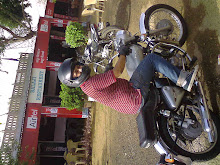Sunday, May 4, 2008
Social stigma, social laws, socially correct behavior, rules for society, dress codes for functions, how we talk, how we walk, how we behave, everything has been set down by society. There now exists a certain social fabric that engulfs us and this is not necessarily a good thing.
It now exists in such a way that it confines us, maybe not physically but to a large extent mentally. It affects the thought process of society and the individual and restricts our thinking from going into certain socially forbidden areas of thought.
Society decides for us what is good or bad, not plain and simple reason or logic.
Think about it. What does our freedom count for? Are we really free?
We are literally bought and sold in the marketplace. Running after jobs, sitting for interviews, trying to prove our worth. We learn things that are thrown to us without thinking, without reflecting, without questioning and then regurgitating it when asked for. We cram ourselves with everything so as to be able to "SELL" ourselves better.
Our thought has been so mangled by societal pressures that we don’t look objectively at anything.
We judge men as members of a community and their standing in it and not as aesthetically delightful objects in their own right. Where one comes from, where one has done ones schooling from, family background etc plays the most dominant role in deciding ones ‘status’.
Even if someone is recognized for their true merit on the basis of their individuality alone and not for their standing in society (e.g someone who is rebellious yet a highly gifted writer) we prefer to observe them from a distance. This is somewhat akin to considering a tiger to be more beautiful than a sheep but preferring the tiger to be behind bars.
We have been conditioned by society to such an extent that we want order in everything so we set in place law and order, procedures, systems and the whole lot. For them order reflects stability and stability lends the illusion of safety.
Besides instilling the illusion of safety it also kills creativity and the need to explore the unknown depths of the human brain and discover the true potential of human creativity which incidentally is limitless. Disorder, chaos, randomness although seemingly useless have some reason, some logic, some rationality backing them.
Consider the case of a seemingly mad man totally ostracized by society, upon extensive treatment by a psychologist, the doctor discovered that he had such high powers of observation that in a passing glance at a rose when a normal man would just notice the flower or at most the petals of the rose this man would also observe the stem, the leaves and the thorns. However his brain was not able to cope with the plethora of information being generated within his head and wasn’t able to process it fast enough for him to continue behaving normally and hence his seeming madness.
He actually was a man with much superior powers than the average man but social order and social positioning put him way down in the pecking order.
Social development varies across countries, with societies of some countries seemingly more advanced than the societies of others. But here the question arises on what basis do you judge whether a society is more advanced. A simple and logical answer would be that a society which promotes free thought, freedom of expression, freedom to do newer and varied things to a larger extent is more advanced than the society which puts a lot of curbs and checks on them.
Finally society expects order and structure to everything and conventions that are established to be followed at every step and turn but there are always the few dissenting voices that rebel continuously and try to balance order and structure with disorder and chaos and originality.
Even articles for that matter are expected to have a structure and order and minimum digression and all the other features that are expected in a ‘standard’ article but as every yin has its yang so does writing. After all it is better not to tread the beaten path.
Also published in The Pundit.
14th Feb,2008
Labels: Philosophy, Society




0 comments:
Post a Comment